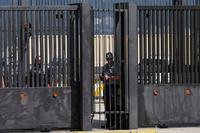Twenty-one years after the 9/11 terrorist attacks, the Defense Department has decided to halt conferral of the National Defense Service Medal, effective Dec. 31.
Army Maj. Charlie Dietz, a Pentagon spokesman, said Wednesday that the authorization to award the medal to all who serve on active duty will be "terminated," based on the fact that the U.S. is no longer involved in large-scale combat operations in response to the 2001 terrorist attacks on civilians in New York City; Arlington, Virginia; and Pennsylvania.
The decision, first reported by Military Times on Tuesday, signals a move toward a peacetime posture, although troops remain engaged in combat operations in Syria, Somalia, Kenya and elsewhere.
Read Next: It 'Blew Everything Apart.' Osprey Accident Shows Danger of Clutch Issue as Services Keep Flying
According to Military Times, Defense Secretary Lloyd Austin signed the memo ending authorization of the medal on Aug. 30 -- the first anniversary of the U.S. withdrawal from Afghanistan.
The change ends the longest time frame for which the medal was awarded, authorized for all service members who completed basic or officer training since Sept. 11, 2001. Service members previously received the medal from June 1950 to July 1954 for the Korean War; from January 1961 to August 1974 for the Vietnam War; and from August 1990 through November 1995 for Operations Desert Shield and Desert Storm.
The announcement follows a Pentagon decision in early August to stop awarding the Global War on Terrorism Medal to all military personnel who have served since 2003, choosing instead for the award to be given only to troops who participate in a counterterrorism operation for at least 30 days.
Service members had been eligible for that award by working directly or indirectly to support anti-terrorism operations, serving 30 consecutive days or 60 nonconsecutive -- qualifications that meant nearly all who served since Sept. 11, 2001, were eligible for it.
At the same time, the Pentagon revised the criteria for the Inherent Resolve Campaign Medal. Previously, that award was given to those in the ranks who were attached to a unit in Iraq or Syria and served for 30 consecutive or nonconsecutive days.
As of July 1, the Inherent Resolve Campaign Medal will be awarded only to those who serve in Syria -- including its airspace and up to 12 nautical miles out at sea.
The awards decisions signal a continued movement by the military away from combat operations in the Middle East after 9/11. Nearly 7,000 service members died in Afghanistan, Iraq and elsewhere while fighting in the Global War on Terror.
"Certainly, we want to recognize those who have supported and engaged in this operation; certainly, over the last 20 years, a lot of men and women in the U.S. military have worked very hard to counter terrorism," Air Force Brig. Gen. Patrick Ryder, the Pentagon's spokesman, said during a press briefing Monday.
Dietz said that, despite the announcement, the U.S. military continues to fight terrorism across the globe.
"The Department of Defense still continues worldwide counterterrorism operations," he said.
-- Patricia Kime can be reached at Patricia.Kime@Military.com. Follow her on Twitter @patriciakime.












